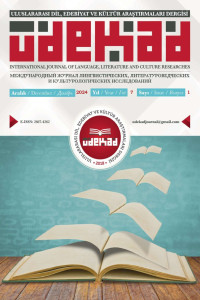Abstract
As a field of study, psychology has been a significant part of human life for decades. Several types of psychological tests have been used in order to understand and assess people’s behavior. Because of their significant roles in identifying the characteristics of human behavior, the need for their translation has also increased to a great extent in recent years. For this reason, in order to provide a functional translation of a psychological test in a different language, it is important to consider the intricacies of translating psychological texts, including linguistic and cultural differences between languages. For this purpose, this study aims to analyze and describe French and Turkish and translations of a certain type of MBTI test written in English. With the aim of identifying and explaining the differences in the source and target texts, the study benefits from J.C. Catford’s model of translation shifts. As a result of a detailed analysis of the source and target texts, it is found out that French and Turkish translations of the specific psychological test cause both semantic and stylistic shifts. Apart from these translation shifts, it is seen that the translators have omitted some parts both in French and Turkish translations.
References
- Bolaños-Medina, A. & González-Ruiz, V. (2012). Deconstructing the translation of psychological tests. Meta, 57(3), 715–739.
- Catford, J.C. (1965). A linguistic theory of translation: An essay in applied linguistics. Oxford University Press. Dewey, J. (1892). Psychology. American Book Company.
- Fenn J., Tan C., George, S. (2020). Development, validation and translation of psychological tests. BJPsych Advances, 26, 306-315.
- Gerçik, İ. Z. (2020). Türk sosyal karakteri üzerine kuramsal bir çalışma. Alanya Akademik Bakış Dergisi, 4 (1).
- Gudmundsson, Einar. (2009). Guidelines for translating and adapting psychological instruments. Nordic Psychology, 61, 29-45.
- Loewenthal, K.M., Lewis C.A. (2020). An introduction to psychological tests and scales. Routledge.
- Muñiz, J., Fonseca-Pedrero, E. (2008). Construcción de instrumentos de medida para la evaluación universitaria. Revista de Investigación en Educación, 5.
- Pittenger, D. J. (December 1993). The utility of the Myers-Briggs Type Indicator. Review of Educational Research, 63(4), 467–488.
- Yurtdaş, H. (2009). Translation of psychology tests: Basic issues and problems. Different Perspectives in Translation Studies, İstanbul Aydın University Publications.
Abstract
Çalışma olanı olarak psikoloji, yıllardır insan hayatının önemli bir parçası olmuştur. İnsanların davranışlarını anlamak ve değerlendirmek için çeşitli psikolojik testler kullanılmıştır. İnsan davranışının özelliklerini belirlemedeki önemli rolleri nedeniyle, psikoloji testlerinin çevirilerine duyulan ihtiyaç da son zamanlarda önemli oranda artmıştır. Bu nedenle, bir psikoloji testinin farklı bir dilde işlevsel bir çevirisini oluşturabilmek için, psikoloji metinleri çevirisinin inceliklerinin farkında olmak önem arz etmektedir. Bu amaçla, bu çalışma İngilizce olarak yazılmış belirli bir MBTI testinin Fransızca ve Türkçe çevirilerini incelemeyi ve betimlemeyi amaçlamaktadır. Kaynak ve erek metinlerdeki farklılıkları belirlemek ve açıklamak amacıyla, çalışmada J.C. Catford’un “çeviri kaymaları” modelinden faydalanılmaktadır. Kaynak ve erek metinlerin ayrıntılı incelenmesinden sonra, söz konusu psikoloji testinin Türkçe ve Fransızcaya yapılan çevrilerinin anlamsal ve biçemsel kaymalara neden olduğu ortaya konmuştur. Bu çeviri kaymalarının yanı sıra, çevirmenlerin hem Fransızca hem Türkçe çevirilerde bazı kısımları sildikleri görülmektedir.
References
- Bolaños-Medina, A. & González-Ruiz, V. (2012). Deconstructing the translation of psychological tests. Meta, 57(3), 715–739.
- Catford, J.C. (1965). A linguistic theory of translation: An essay in applied linguistics. Oxford University Press. Dewey, J. (1892). Psychology. American Book Company.
- Fenn J., Tan C., George, S. (2020). Development, validation and translation of psychological tests. BJPsych Advances, 26, 306-315.
- Gerçik, İ. Z. (2020). Türk sosyal karakteri üzerine kuramsal bir çalışma. Alanya Akademik Bakış Dergisi, 4 (1).
- Gudmundsson, Einar. (2009). Guidelines for translating and adapting psychological instruments. Nordic Psychology, 61, 29-45.
- Loewenthal, K.M., Lewis C.A. (2020). An introduction to psychological tests and scales. Routledge.
- Muñiz, J., Fonseca-Pedrero, E. (2008). Construcción de instrumentos de medida para la evaluación universitaria. Revista de Investigación en Educación, 5.
- Pittenger, D. J. (December 1993). The utility of the Myers-Briggs Type Indicator. Review of Educational Research, 63(4), 467–488.
- Yurtdaş, H. (2009). Translation of psychology tests: Basic issues and problems. Different Perspectives in Translation Studies, İstanbul Aydın University Publications.
Details
| Primary Language | English |
|---|---|
| Subjects | Translation and Interpretation Studies |
| Journal Section | Research Articles |
| Authors | |
| Early Pub Date | March 29, 2024 |
| Publication Date | March 31, 2024 |
| Submission Date | November 28, 2023 |
| Acceptance Date | February 14, 2024 |
| Published in Issue | Year 2024 Volume: 7 Issue: 1 |
* It is important for our referees to enter their fields of expertise in detail in terms of assigning referees in the process.
* The articles sent to our journal can only be withdrawn by giving reasons during the preliminary evaluation process. It is not possible to withdraw the articles that have started the evaluation process. Thank you for your understanding and we wish you good work.


